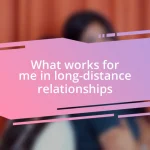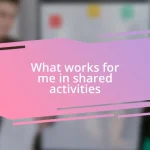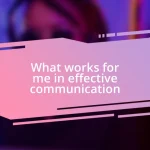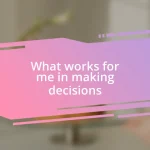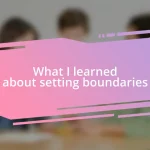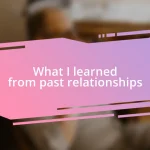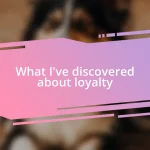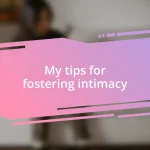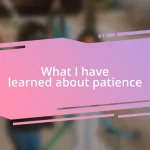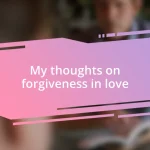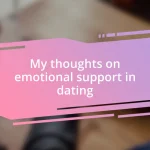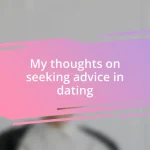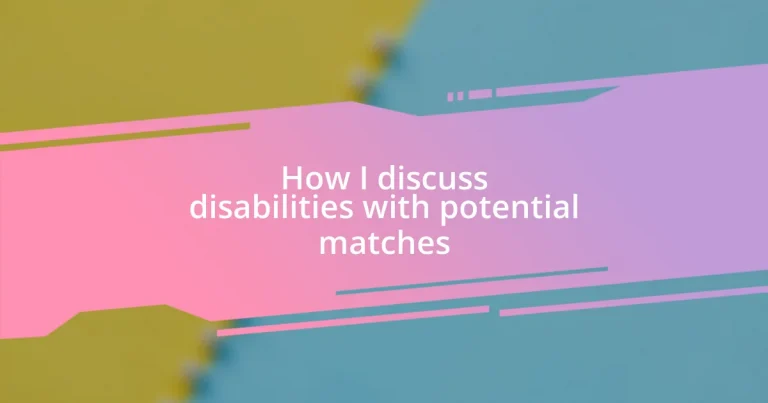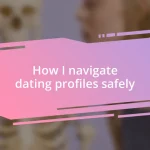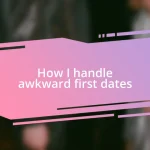Key takeaways:
- Open communication about disabilities fosters trust and deeper connections, enhancing the overall dating experience.
- Sharing personal stories and experiences can transform potentially awkward conversations into meaningful exchanges, promoting mutual understanding.
- Reflecting on discussion outcomes highlights how such conversations can inspire empathy and encourage a broader perspective on disability among peers.
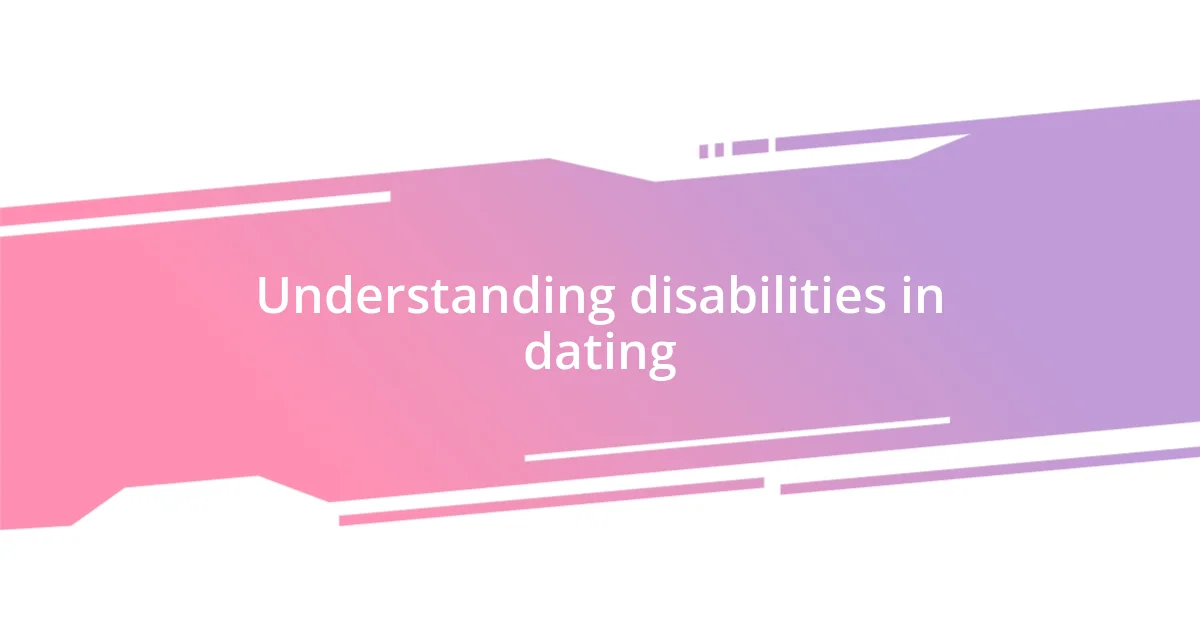
Understanding disabilities in dating
Understanding disabilities in dating requires empathy, patience, and an open mind. I remember a friend of mine shared her experience with dating while living with a chronic illness. Instead of fear or hesitation, she chose to disclose her condition early on, which led to deeper connections based on trust and understanding. Have you ever thought about how sharing vulnerabilities can transform the dynamics of a relationship?
When it comes to disabilities, some may assume that they define a person, but that’s rarely the whole story. For instance, someone might use a wheelchair but have a vibrant personality and interests that shine much brighter than their physical limitations. I think it’s essential to consider that the characteristics which shape us go far beyond any diagnoses or disabilities.
Navigating the world of dating while addressing disabilities can evoke a whirlwind of emotions—anxieties, hopes, and sometimes, a bit of frustration. I recall feeling a mix of excitement and apprehension when engaging with a match who was open about their hearing impairment. Instead of barriers, we found new ways to connect, proving that understanding and adaptability often pave the way for meaningful relationships. How often do we overlook the potential for profound connections simply because of preconceived notions?
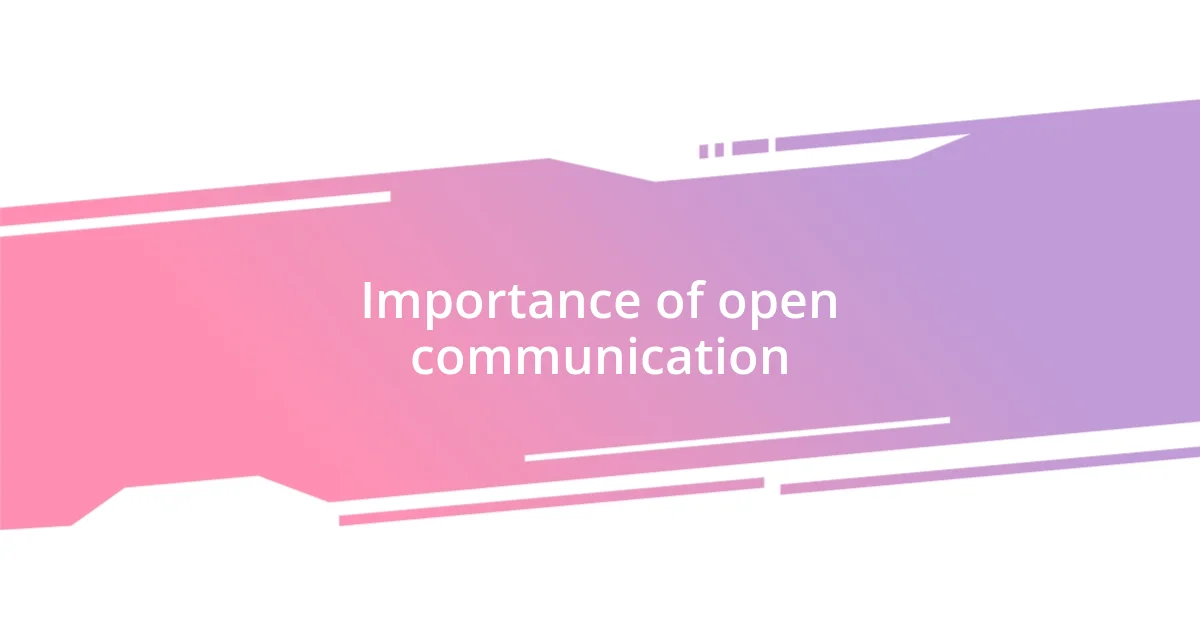
Importance of open communication
Open communication about disabilities is crucial in forging genuine connections. From my experience, when I openly discussed my own challenges with a previous match, it felt like lifting a weight off my shoulders. This vulnerability led to authentic conversations that not only deepened our understanding of each other but also fostered a sense of safety and trust in the relationship.
In my view, when partners communicate openly, it enhances the overall dating experience. I remember chatting with someone who struggled with anxiety about sharing their disability. Encouraging them to open up allowed the space for candid discussions about our experiences, creating a bond that felt more meaningful. The connection grew stronger as we both shared our concerns and triumphs; it became clear that our disabilities were just part of a larger picture.
Consider the benefits of this open dialogue: clarity, reduced misconceptions, and enhanced empathy. I’ve observed that when both partners express their thoughts and feelings freely, it can significantly reduce the uncertainty and anxiety often surrounding dating. This kind of communication not only cultivates a supportive environment but also promotes mutual respect and understanding. Isn’t it fascinating how a simple conversation can reshape our perspectives and create a sense of belonging?
| Benefits of Open Communication | Examples |
|---|---|
| Clarity in Relationship Dynamics | Discussing expectations and boundaries early on |
| Building Trust | Sharing personal experiences and feelings openly |
| Reducing Misconceptions | Addressing stereotypes associated with disabilities |
| Enhancing Empathy | Learning about each other’s challenges fosters compassion |
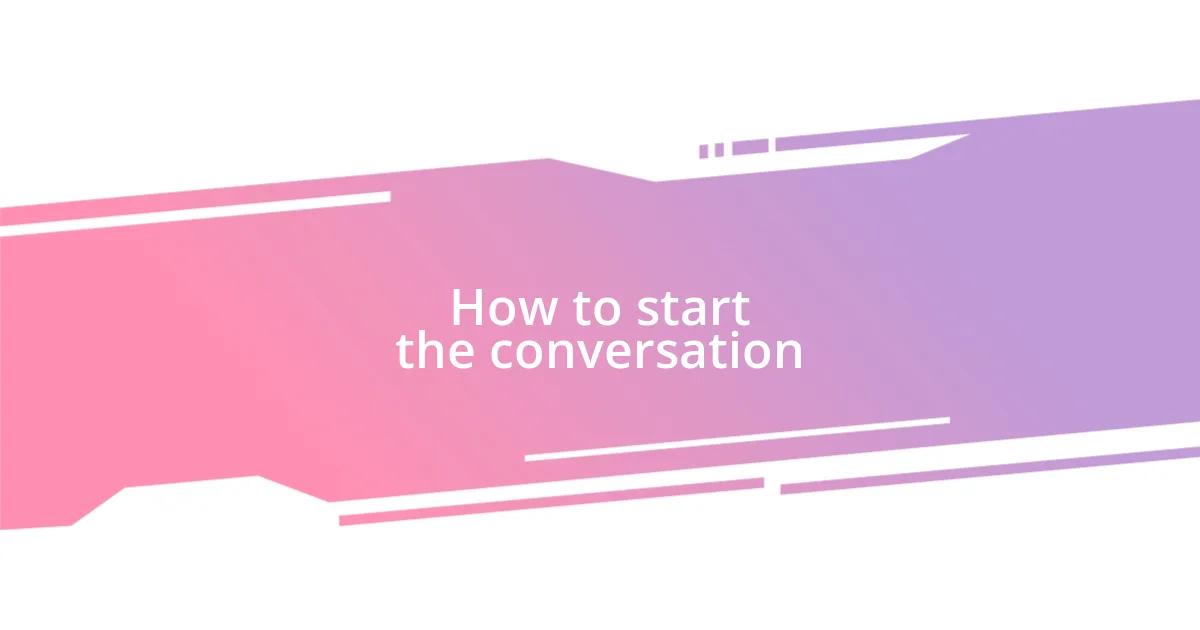
How to start the conversation
Starting the conversation about disabilities in dating can feel daunting, but I believe that approaching it with honesty can be incredibly liberating. In my experience, I’ve found it helpful to mention a personal story or even a light-hearted comment to break the ice. For instance, I once joked about how I often forget my glasses, which led smoothly into talking about a friend who navigates the world with a visual impairment. This kind of casual segue can ease the tension and open the door to deeper discussions.
When you’re ready to bring it up, try considering the following approaches:
- Be Direct but Gentle: Mention your experiences naturally, like it’s just another part of your story.
- Use Humor: A light-hearted comment can help defuse any awkwardness.
- Ask Open-Ended Questions: Inquire about their feelings toward disability, which invites them to share their perspective.
- Share Your Experience: Talk about your personal journey; it can inspire reciprocal sharing.
- Create a Comfortable Space: Ensure that the setting feels safe and private, allowing both of you to discuss freely.
Remember, the goal isn’t to overwhelm your date but rather to foster an atmosphere of understanding and connection. Sharing your story can be the first step toward building that trust.
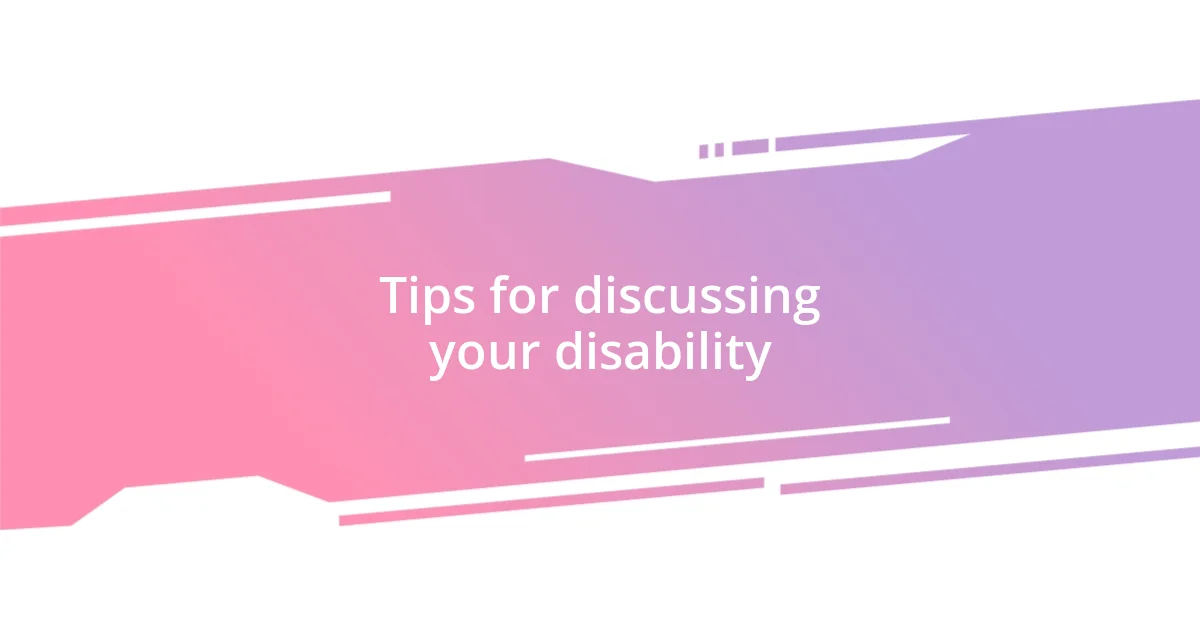
Tips for discussing your disability
When discussing your disability, it’s essential to choose a moment that feels right. I recall a time when I was on a date at a cozy café, and the conversation flowed naturally. When I felt comfortable, I casually shared how my disability influences my daily life. It felt liberating, and the other person responded with curiosity rather than pity. Isn’t it amazing how the right timing can transform a potentially tense conversation into a meaningful exchange?
Emotional honesty is another key aspect. I remember a conversation with someone who expressed a moment of frustration about their limitations. I shared my own struggles, which created an understanding that went beyond words. It struck me how opening up about feelings not only fosters empathy but also builds a true connection. Doesn’t sharing our vulnerabilities create a bridge that feels impossible to cross when we hold back?
Lastly, think about your audience. While I’ve had successful discussions in casual settings, I’ve also experienced moments where the person wasn’t ready to engage on this level. By gauging their reactions and adjusting my approach, I ensured our conversation remained comfortable and respectful. Have you ever noticed how sometimes, just reading someone’s body language can guide you in these delicate discussions? It’s all about creating a space where open dialogue can flourish, allowing both partners to feel safe and valued.
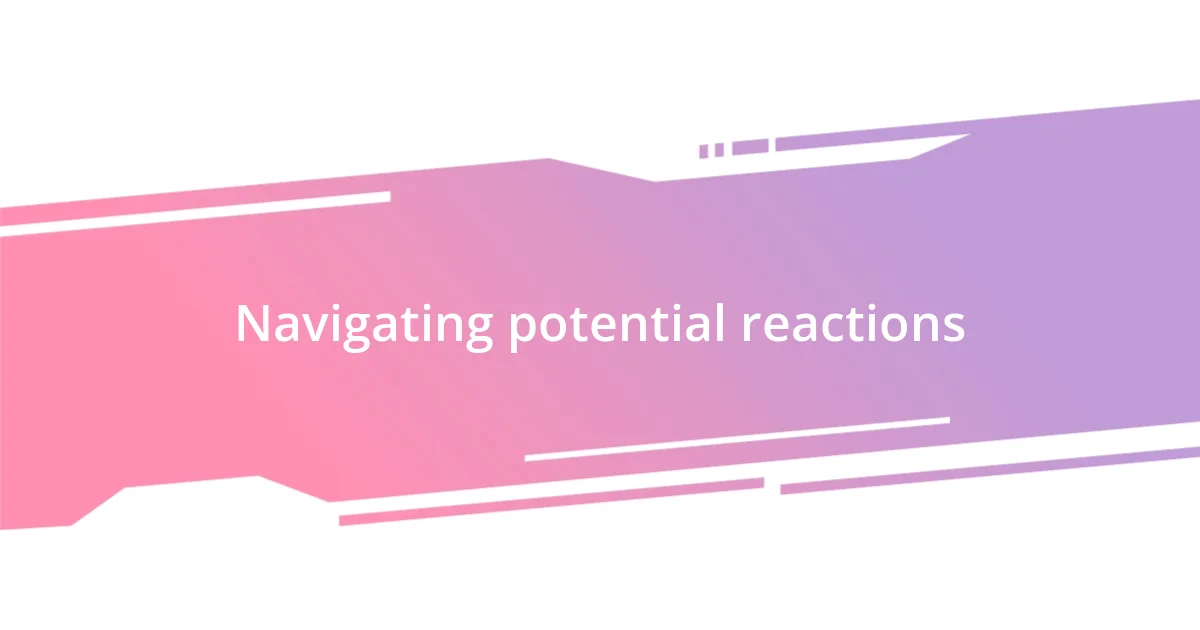
Navigating potential reactions
Navigating potential reactions can be a real challenge. I remember one date when I decided to share my experience with a learning disability. Right after I mentioned it, I could see a flicker of surprise on their face. It made me pause for a moment, wondering if I should clarify or if they would ask questions. Experiences like this remind me just how unprepared some people might be when faced with topics around disabilities. Have you ever felt that moment of uncertainty?
Sometimes, the most meaningful conversations come from unexpected reactions. I once spoke with a match who initially seemed taken aback but then opened up about their own struggles with anxiety. Our exchange transitioned from discomfort to solidarity in no time. That’s the beauty of vulnerability; it invites connection, even in the face of initial awkwardness. With genuine reactions, we uncover shared human experiences, turning potential misunderstanding into a powerful bond.
I’ve learned that not all reactions will be positive, and that’s okay too. On one occasion, a date simply didn’t know how to respond, and the silence became palpable. I took a deep breath and decided to address it directly. I asked if they had any questions or if they felt uncertain about what I’d shared. The conversation shifted dramatically, creating a space for both of us to express our thoughts openly. Isn’t it interesting how addressing discomfort head-on can transform a situation? It’s a reminder that navigating these discussions requires patience and a willingness to seek understanding.
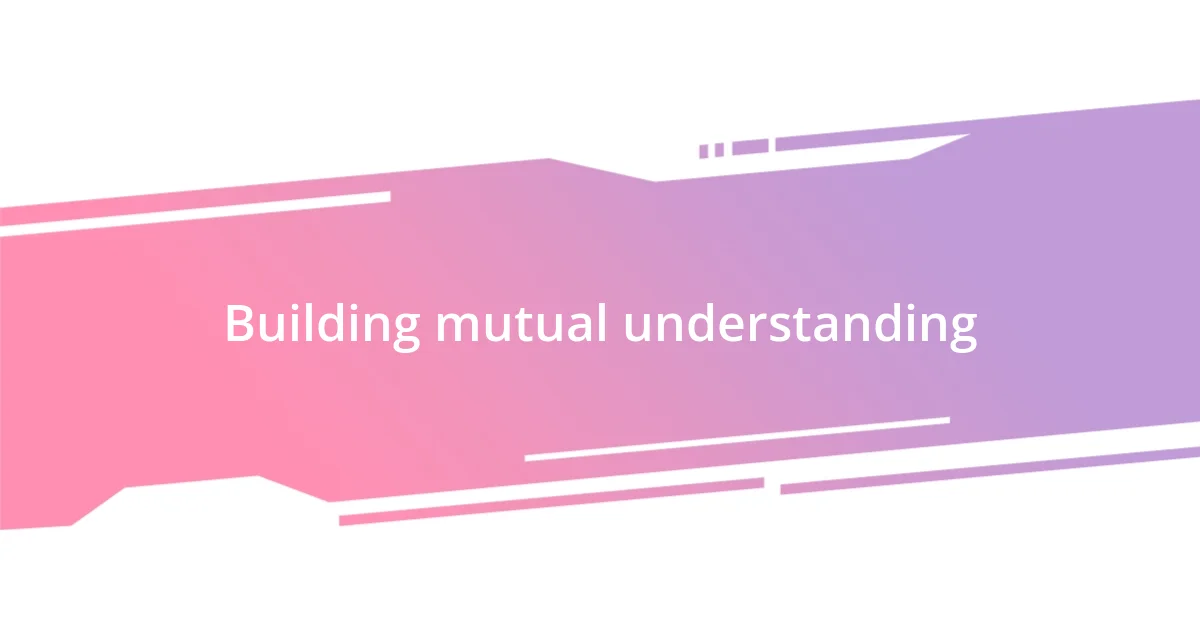
Building mutual understanding
Building mutual understanding is about creating a space where both partners feel valued and heard. I remember a time when I was candidly discussing my visual impairment with someone I was really interested in. Instead of shying away from the topic, I invited them to ask any questions they had. Their eyes lit up with genuine curiosity, and by the end of our conversation, we were sharing stories about our different perspectives on life. Have you ever felt that spark of connection when both parties openly engage?
In another instance, I reflected on my experiences in group activities that are often affected by my disability. By illustrating how I adapt and find my own ways to join in, I could see my date’s understanding deepen. I realized that sharing these personal stories not only clarifies the impacts of my disability but also reveals a part of who I am. Isn’t it profound how our differences can lead to richer conversations and immersive exchanges?
I also see immense value in actively listening to my match’s stories and experiences. One evening, my date shared their own journey with a chronic illness. I felt grateful for the trust they placed in me, and in that moment, our discussions about disability shifted to a broader dialogue about resilience and strength. This two-way sharing cultivated a bond that extended beyond our individual challenges. Don’t you think that building mutual understanding is really about showing that we’re all navigating our own unique paths?
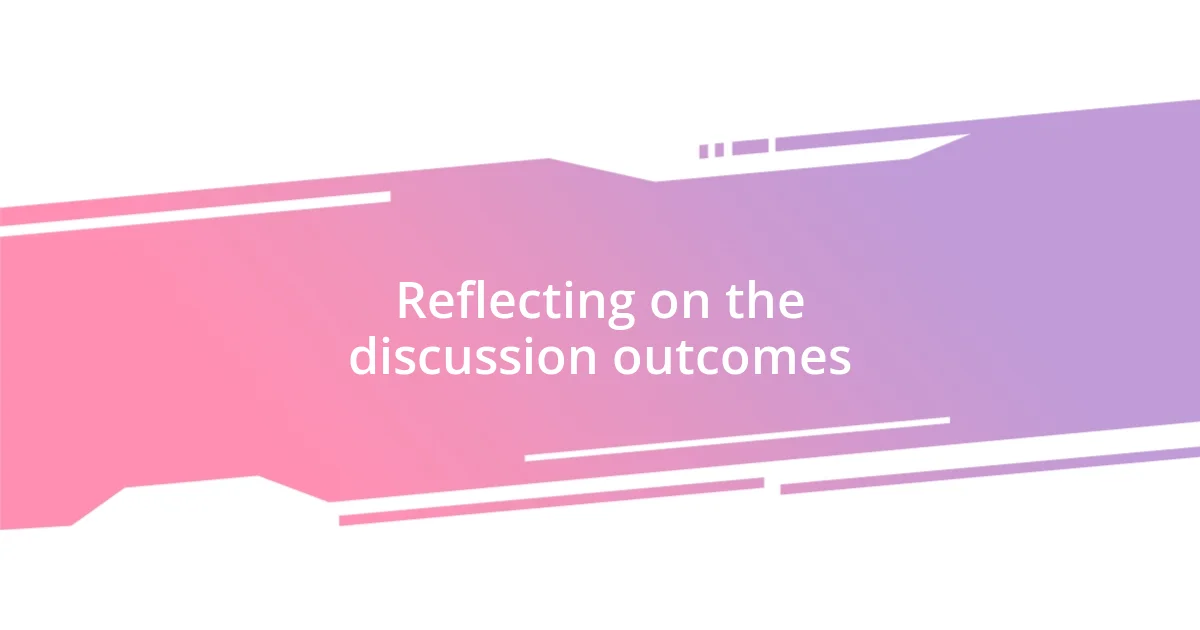
Reflecting on the discussion outcomes
Reflecting on discussion outcomes often reveals how these conversations reshape our perspectives. I recall a moment when my date responded positively after I shared my experiences with my disability. Their acceptance sparked a lively debate about societal perceptions of disability, which not only made me feel validated but also helped me see how conversation can promote awareness and inspire empathy. Have you ever noticed how a simple dialogue can redefine someone’s understanding of a topic?
It’s enlightening to dissect how sharing my story influenced the date’s curiosity. After revealing my challenges, it felt rewarding when they opened up about a family member with a disability, showcasing how our exchange fostered understanding beyond just us. This interconnection highlights that these discussions are not solely about my experiences but also about those we interact with. Would you agree that engaging in such dialogues often leads to collective learning?
The outcomes of these conversations can sometimes linger longer than expected. I remember a few weeks later, receiving a message from that same date, expressing gratitude for our talk. They mentioned how it encouraged them to rethink their approach to inclusivity in their social circles. It’s these moments that remind me of the ripple effect honest conversations can create. Don’t you think that transforming misunderstandings into lessons can reveal incredible insights not just for ourselves, but for others as well?
